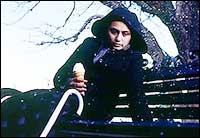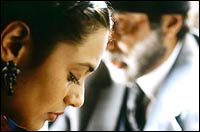 In the beginning, there was Khamoshi.
In the beginning, there was Khamoshi.
Then, there was Black.
Khamoshi, for the most part, was the work of an amateur.
Black, for the most part, is the work of a director who is obstinate enough to do exactly as he pleases. Or suffers, as Sanjay Leela Bhansali is wont to do.
That's good news. For now. One reason why, is a beacon: Ayesha Kapur.
You can't help despairing, when you see film after Hindi film redefining the art of dumbing down children (in a recent film, a ten year old repeatedly shrieked and clapped as he alternated between, "I hate you, Dad!" one moment when he didn't get his way, to, "Dad, you're the greatest!" when he got it the next).
So when ten-year-old Ayesha 'speaks' so lucidly and powerfully in Black, you think there is hope, after all. Sure, she has an author-backed role guaranteed to swing every vote in the house, but she still rises and shines above it all.
![]()
More on rediff.com!
![]()
![]()
![]()
![]()
Ash on David Letterman!![]()
Industry is tentative about Black![]()
Is Anurag Kashyap jinxed?![]()
![]()
![]()
Little Michelle McNally is an 'animal,' as she reflects, about 40 years later.
One man Debraj Sahai (Amitabh Bachchan) wrangles himself into the responsibility of turning the blind, deaf and mute girl into a 'fine young lady' (as Michelle's mother Catherine, played with grace by Shernaz Patel, says).
With no choice but the hope of seeing a human side to his otherwise violent and ferociously incoherent daughter, Paul (Dhritiman Chatterjee), stands by, after much fuming and fretting at the drunk, 'ill-mannered' teacher.
The rest of the film highlights her journey as she tries hard to overcome her physical limitations and fulfil their dream about making her independent.
 A subject like this practically cries for sympathy, and Sanjay Leela Bhansali's script is propped by visual metaphors and symbols, some of which are rather too obscure. For instance, what were those huge sketches doing, fading in and out when Catherine discovers her child will be blind, deaf and mute?
A subject like this practically cries for sympathy, and Sanjay Leela Bhansali's script is propped by visual metaphors and symbols, some of which are rather too obscure. For instance, what were those huge sketches doing, fading in and out when Catherine discovers her child will be blind, deaf and mute?
It is also anchored in extreme melodrama. So even though you respect the director's trademark unabashed, 'full-bloodied' expression, that is what stops the film short of becoming an 'international product.' Which is what the film's international producers, Yash Raj Films, are pitching it as.
And as much as you acknowledge the contrast between the visual flourish of the film's outer world (framed with exquisite ease by Ravi K Chandran, a departure from the Bhansali regular, Binod Pradhan), and the empty vacuum of Michelle's inner world, there is a nagging thought: it over-reaches in its efforts to make the world and its people so perfect, so beautiful.
With the exception of Sara and the strict Paul's fleeting shades towards grey, the rest are as whiter-than-white as the hospital room shown later in the film.
It doesn't take much to guess that is the world the director would like Michelle to see. But then again, she says, at different points in the film, 'I have been suffocating in this dark world I touched Sara (her younger sister, played by Nandana Sen, who could really do with some coaching), and I touched beauty.'
And you think, well, maybe we didn't quite need all those candles lined and lit just so; that bathtub in the centre of a vast, empty room with a single ray of light shining on it, Kora Kagaz-style, when Catherine discovers her daughter will not see, hear or speak; and those frightening, frightening sculptures lined all over that huge colonial house.
Yes, Michelle has suffered. She is practically suffocating in her dark world. And, as much as you want to see her triumph, you wish her resolutions, thanks to the script, weren't quite so pat.
You also wish Bhansali had avoided the subject of sex. As it stands, it is awkward, clumsy. It might have needed to be expressed, but, surely, not in this way?
 Prakesh Kapadia's deft dialogues, however, lift the script. So do the hide-and-seek glimpses of a comic touch -- watch Amitabh Bachchan saying, 'bull*&^%', in sign language; and the initial meeting between Debraj Sahai and little Michelle McNally.
Prakesh Kapadia's deft dialogues, however, lift the script. So do the hide-and-seek glimpses of a comic touch -- watch Amitabh Bachchan saying, 'bull*&^%', in sign language; and the initial meeting between Debraj Sahai and little Michelle McNally.
Michelle's romanticised journey has been well contained to two hours and 20 minutes by some deft editing (if you excuse the dragging latter half of the film), by Bela Segal, the director's sister.
Resul Pookutty gives sound to Michelle and speaks volubly enough. But you do wish every high and low wasn't accompanied by a blistering crescendo (thanks to Monty's otherwise good background score). Why, silence would have served just as well, and would have been twice as much impactful, considering it is a movie about the 'black, silent world.'
The sound in the second half of the film, when Debraj stretches Michelle's hand out the window and into the rain, will have your heart jump: it startles you out of your wits!
Speaking of Michelle, the performer in Rani Mukerji must have turned more than a few mental cartwheels when she got Black. It is a pure, performance-driven role, and Rani does it with a fluid maturity that is great to watch.
Her chemistry with Amitabh Bachchan makes for some cool screen moments. The two command screen presence, and it is hard to take your eyes off them.
And what were Amitabh Bachchan's grandiloquent speeches all about?! Part director's fault, part dialogue, the result is some melodramatically hammed solo scenes!
Mahabanoo Mody-Kotwal's cameo as Ms Nair, Debraj Sahai's sympathetic confidante, was a pity, with not much scope or screen time to do any justice to the actress.
Unlike Sanjay Leela Bhansali. It's obvious he has worked himself to the grind with the film. And the film shows 'him' in every frame. Some call it intruding, some call it poetry, depending on your viewpoint.
And though there would be many ways to describe Black: SLB's indulgence, SLB's pain, SLB's pleasure, SLB's passion, and so on, here's really hoping he gives shape and voice to stories and characters that people stronger, more polished films.





